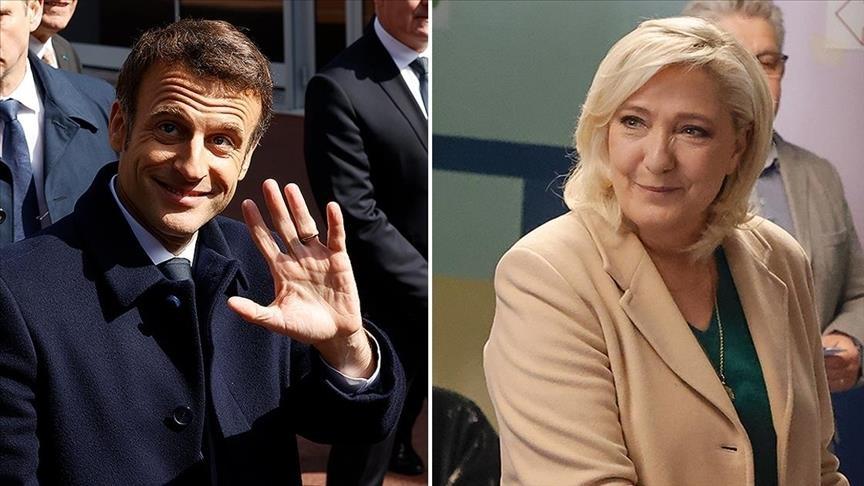Macron vs. Le Pen: Who is next Elysée Palace master? Russian francologist's interview with Caliber.Az
Caliber.Az presents an interview with Igor Ignatchenko, candidate of historical sciences, Russian francologist, an associate professor at the Institute of Social Sciences of the Russian Academy of Sciences.
- On April 24, France will face the second round of presidential elections. Will Macron be able to defeat Le Pen? Since the times of Jacques Chirac, no French president has managed to be re-elected for a second term.
If we assess the prospects for the second round of the presidential elections in France, we can say that today the current head of state Emmanuel Macron has more chances of success than Marine Le Pen, because more candidates who have gone off the course, politicians who have had some influence in the past, speak out in his support. Hollande and Sarkozy have already called for a vote for Macron. Sarkozy, by the way, enjoys a certain authority among moderate-right politicians and the corresponding electorate.
Most likely, the gap between Macron and Le Pen at the end of the second round of the presidential election will not be significant. It is unlikely that Macron will be able to score an impressive victory over Le Pen. At the same time, candidates Eric Zemmour and Nicolas Dupont-Henin support Le Pen. This would add some votes to Marine Le Pen, maybe up to 10 percent, but it might not be enough to succeed in the campaign.
Nevertheless, if Macron wins this election, he will become the second French president since Jacques Chirac to be elected for a second term.
If you make a historical analogy, you can see that in 2002 Jacques Chirac won the presidential election for the second time due to the fact that then, unexpectedly, instead of Lionel Jospin, representing the Socialist Party of France, the far-right candidate Jean-Marie Le Pen, father of Marine Le Pen, who is now rushing to power, entered the second round. At that time, almost all of France rallied around Jacques Chirac only because no one wanted to vote for Jean-Marie Le Pen because his slogans seemed absolutely excessive, much harsher than those put forward by Marine Le Pen even 5 years ago. Actually, the victory of Jacques Chirac was achieved precisely by mobilizing the whole country against the alternative candidate, not in support of Chirac. If Lionel Jospin had made it to the second round, many analysts assumed that he would be the president of France. And now a similar situation is being observed. In fact, there could be a protest at the vote when everyone will unite precisely against Marine Le Pen and not in support of Macron because over the past 5 years Macron has made quite unpopular decisions in the country. And now on one side of the scale is the prospect that Macron will remain president for another 5 years and will continue the old policy, which is not very popular in the country, on the other side is Marine Le Pen, whose radical mood scares everyone. And here could be a repeat of the 2002 scenario - a mobilization vote against the Le Pen family. The same thing was happening five years ago.
In general, we can say that at the moment Macron has a better chance than Le Pen, but the gap will not be significant.

- To what extent did the war in Ukraine help Macron in the elections?
Of course, Macron took advantage of the difficult international political situation. First, it should be noted that he declared his candidacy for a second term rather late, which gave him some advantages. In fact, he also avoided taking part in debates, hiding behind the need to participate in negotiations on the situation in Ukraine. And the mobilization of the country around the national flag allowed Macron to avoid a serious debate on the situation inside the country, which could have been unfavorable to him.
In addition, let us not forget that had it not been for the coronavirus pandemic, the "Yellow Vests" movement would still have continued its demonstrations. However, first the pandemic and then the situation in Ukraine allowed Macron to distract the attention of the nation from difficult domestic economic problems, problems related to the growth of unemployment and the impoverishment of the population. So we can say that the situation in Ukraine favored Macron.
- What do you think determines the outcome of the French elections - the foreign policy agenda or the social agenda?
In fact, we can say that both. Here, in general, we see two approaches. Macron puts more emphasis on the foreign policy agenda. Yes, he talks about the need to be committed to the values of democracy, freedom, and European political institutions, but he puts the international situation at the centre of attention. Marine Le Pen, on the contrary, is more focused on the social agenda. This is the very topic she is focusing on in the current presidential election. And on the whole, it is understood by a large part of the common people. Not the elites, but the voters whose financial situation has deteriorated over the past five years.
Here, perhaps, the outcome of the election can be predetermined by a kind of "Le Pen complex". That is, the Le Pen family is traditionally a convenient target for opponents, given the entire political history of this family, especially given the statements of Marine's father, Jean-Marie Le Pen. So rather, other factors may play a role here, just as they did in the last presidential campaign in 2017.
If Jean-Luc Mélenchon had made it to the second round instead of Le Pen, and there was a duel between him and Macron, then, in my opinion, Macron would have had a much harder time than with Marine Le Pen. As it is, the scenario from 5 years ago of intimidating the French with the prospect of Marine Le Pen coming to power is likely to be repeated.

- Will Macron's policy towards the South Caucasus change if he is re-elected?
In case Macron is re-elected for a second term, his policy towards the South Caucasus will not seriously change. All the other outlines of the French foreign policy in the South Caucasus region were set during his first presidential term, so no significant changes are expected here. It seems that in the Armenian-Azerbaijani issue, France will be more focused on Armenia. Basically, Macron's behaviour is predictable. Actually, it is possible to look at and assess the French-Azerbaijani relations over the past 5 years and simply prolong these relations for the next 5 years.
As for Marine Le Pen's potential policy towards Azerbaijan, it is quite difficult to draw any serious conclusions here at the moment, if only because theory often diverges from practice. Therefore, any statements by Marine Le Pen concerning Baku and the South Caucasus, in general, do not mean that this policy will continue if she is elected president. It is enough to recall how Macaron was elected. During his election campaign in 2017, there were many anti-Russian statements, however, when he became president, the degree of tension decreased somewhat and Macron's subsequent statements already as the head of France were more restrained and moderate.
Moreover, if Marine Le Pen becomes president, she will be more interested in France's domestic political problems. Perhaps she will pursue a more national, anti-globalist course, and her policy will be more focused on the internal problems of the country rather than external ones.








